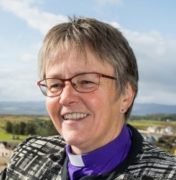I’ve been doing a wee daily thought, no more than two minutes in length, every day since lockdown began. It goes out on social media.
I started because someone in the congregation, fearing what was ahead, asked if I might offer a wee prayer each day just to keep people going.
At the time, it seemed like it might only be for a few weeks – maybe a month or two. Thirteen weeks later I am still at it.
I did wonder who might want to listen in. Would I be talking only to myself? But I have been utterly amazed at all the connections that have been made through those rambling thoughts.
I have reconnected with schoolfriends and people I met when I was a student and, even better still, with so many locals who would never darken the door of the church. Then there are all those in other parts of the world who tune in and leave a message.
Before there’s any danger of me getting big-headed though, only about half of them ever listen in to the fuller service on a Sunday. And of those who do, fewer still make it through all 18-20 minutes.
I confess though, that these recent forays into the online world have got me wondering about how things will be when this lockdown is over.
Do I drop the social media stuff and go back to expecting people to turn up at 11 o’clock on a Sunday morning? Or do I keep it going while doing the Sunday morning thing as well?
If I am honest, I don’t think it is possible to go back to the “same old”. And I think that for a variety of reasons.
Right now, people are choosing when they tune in to the thoughts and the services. They are doing it at all sorts of times of the day and night. They are doing so from the comfort of their own home and in their pyjamas or gardening gear. They listen to all, or just a little. They can pause me or mute me or fast forward to something more interesting.
Listening online offers people a freedom that is not open to them when they are physically in church, and that would include the choice to switch off or to go elsewhere.
But the online stuff offers more. If you want to see what happens at a service, if you want to test the waters of what the Christian faith is about, you can do it from a safe distance online without the fear of people seeing you or of others reeling you in. Anonymously. I like the idea that people can lurk around the edges of church life to get a taste of what it is about and discover a bit more of the Jesus we are trying to follow.
That said, there are a number of downsides to the technological approach to worship.
I confess to feeling slightly uncomfortable about what could be called a more “consumerist” approach to Christianity, whereby people shop around for the style and the sound of worship that suits them. It makes me uncomfortable because there’s a danger that people might then avoid the tough bits of the Christian faith and concentrate instead of the easier, feel-good stuff.
That bothers me because I think it is through tussling with the tougher questions that faith throws up that we find our minds being stretched and we grow as people.
On top of that, meeting only online raises the question of how to be a community of believers. Christianity is a faith that is about more than individuals. It is about being a part of the one body of Christ. We have a shared task which is to live out the Gospel.
How do the various people who leave a comment, or who share a post, make that important connection and get a feel for that sense of belonging? How do they know they are a part of something that not just links people to each other, but ties us all together?
It seems to me that is much harder to do virtually than it is physically.
One last concern is regarding commitment. Clicking on a “like”button is easy. But how do we hold ourselves to account for what we are liking? How do we let the words we hear affect and infect the things we do and say? Perhaps even change us and through us, change the world.
So here is my, and every minister’s, task over these next few weeks: To find times and ways of helping people of all sorts and ages to come together to think and pray, to listen and talk, to find inspiration, encouragement and the incentive to live more wholeheartedly – and to do that as part of a community of believers, committed to caring for God, for the world and for God’s people.
If, as the Church of Scotland, we fail to rise to that challenge it could very well be terminal. Others however, will step in.
What say you?
The Very Rev Susan Brown is minister of Dornoch Cathedral and a former moderator of the General Assembly of the Church of Scotland

